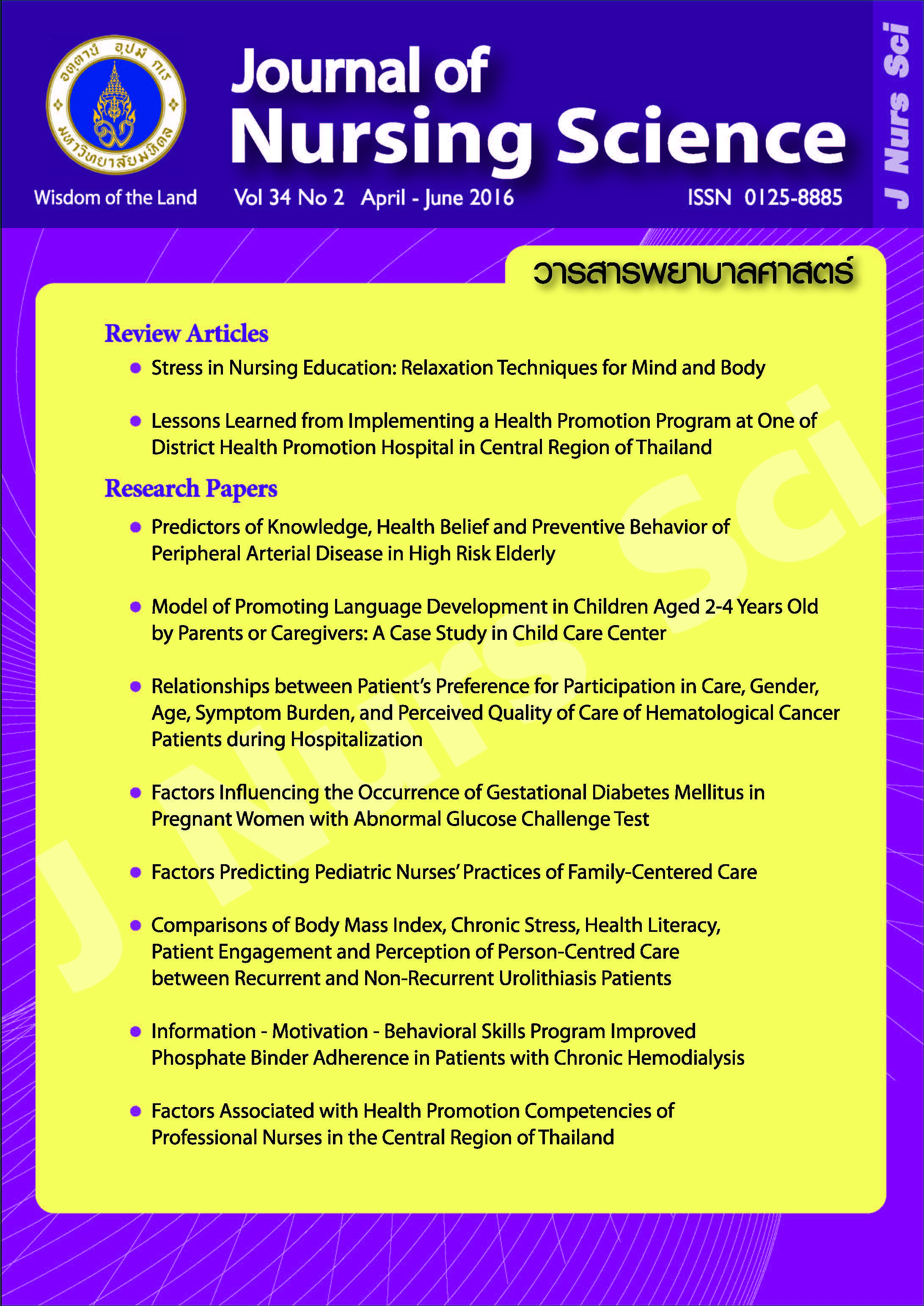Model of Promoting Language Development in Children Aged 2-4 Years Old by Parents or Caregivers: A Case Study in Child Care Center
Main Article Content
บทคัดย่อ
Abstract
Purpose: To develop the model of promoting language development in children aged 2-4 years old by parents or caregivers.
Design: Participatory action research.
Methods: Key informants were 7 participants, including 5 parents or caregivers and 2 teachers. Data were collected using in-depth interviews, focus group and reviewing data documentation. Content analysis was used to analyze the data.
Main findings: Model of promoting language development in children aged 2-4 years old by parents or caregivers comprised of 3 main components. The first one is to spend time together between parents and children in any activities interested to the children i.e. singing, reading or
telling story. Also asking questions which leading those children to analyze wider. The second component is to give an opportunity for children to show their ability through doing activities together with parents or caregivers, persuade them to help themselves in their daily lives activities. Another way is to assign them to do easy tasks e.g. sweeping the floor or watering the plants. The last component is to give positive reinforcement and give them compliments.
Conclusion and recommendation: Parents or caregivers, teachers and others who provided care for children will be able to use result to apply and use it as the guideline in different way for promoting especially in language development for children aged 2-4 years old.
Keywords: language development, children, participatory action research
รูปแบบการสร้างเสริมพัฒนาการด้านภาษาแก่เด็กอายุ 2-4 ปี โดยบิดามารดาหรือผู้ดูแล: กรณีศึกษาศูนย์พัฒนาเด็กเล็ก
บทคัดย่อ
วัตถุประสงค์: เพื่อพัฒนารูปแบบการสร้างเสริมพัฒนาการด้านภาษาแก่เด็กอายุ 2-4 ปี โดยบิดามารดาหรือผู้ดูแล
รูปแบบการวิจัย: การวิจัยเชิงปฏิบัติการอย่างมีส่วนร่วม
วิธีดำเนินการวิจัย: กลุ่มตัวอย่างที่เป็นผู้ให้ข้อมูลหลัก 7 คน ได้แก่ บิดามารดาหรือผู้ดูแลจำนวน 5 คน ครูจำนวน 2 คน การเก็บข้อมูล โดยการสัมภาษณ์เชิงลึก การสนทนากลุ่ม และการศึกษาข้อมูล จากเอกสารที่เกี่ยวข้องวิเคราะห์ ข้อมูลโดยการวิเคราะห์เชิงเนื้อหา
ผลการวิจัย: รูปแบบการสร้างเสริมพัฒนาการด้านภาษาแก่เด็กอายุ 2-4 ปี โดยบิดามารดาหรือผู้ดูแล มี 3 องค์ประกอบสำคัญ องค์ประกอบแรก คือ การให้เวลา ในการทำกิจกรรมที่เด็กสนใจร่วมกันกับบิดามารดาหรือผู้ดูแล เช่น การเล่น เล่านิทาน ร้องเพลง หรืออ่านหนังสือ การพูดคุยซักถามสิ่งที่เด็กได้พบเห็น ด้วยการตั้งคำถามปลายเปิดกระตุ้นให้เด็กคิดหาคำตอบ องค์ประกอบที่ 2 การให้โอกาส เป็นการสร้างโอกาสให้เด็กได้แสดงความสามารถของตนเองด้วยการทำกิจกรรมร่วมกันกับบิดามารดาหรือผู้ดูแล ชักชวนให้เด็กได้ช่วยเหลือตนเองในกิจวัตรประจำวัน ฝึกให้ช่วยทำงานบ้าน พร้อมกับมอบหมายหน้าที่ง่ายๆ ในชีวิตประจำวัน เช่น กวาดบ้าน รดน้ำต้นไม้ องค์ประกอบสุดท้าย การให้แรงเสริมทางบวก เป็นการทำให้เด็กเกิดความภูมิใจ พร้อมกับพูดชื่นชมเมื่อเด็กปฏิบัติได้ถูกต้องเหมาะสม เมื่อเด็กทำงานได้สำเร็จเด็กก็เกิด ความภาคภูมิใจและเห็นคุณค่าในตนเอง อันจะเป็นพื้นฐานสำคัญ ที่จะส่งผลต่อความสำเร็จ ในอนาคตของเด็ก
สรุปและข้อเสนอแนะ: บิดามารดาหรือผู้ดูแล ครูและบุคคลที่ให้การดูแลเด็ก สามารถนำผลการวิจัยนี้ไปประยุกต์เป็นแนวทางในการสร้างเสริมพัฒนาการด้านภาษาให้แก่เด็กวัย 2-4 ปี
คำสำคัญ: พัฒนาการด้านภาษา เด็ก การวิจัยเชิงปฏิบัติการอย่างมีส่วนร่วม
Article Details
ลิขสิทธิ์: วารสารพยาบาลศาสตร์เป็นเจ้าของลิขสิทธิ์ในการเผยแพร่ผลงานที่ตีพิมพ์ ห้ามผู้ใดนำบทความที่ได้รับการตีพิมพ์ในวารสารพยาบาลศาสตร์ไปเผยแพร่ในลักษณะต่างๆ ดังต่อไปนี้ การส่งบทความไปตีพิมพ์เผยแพร่ที่อื่น การนำบทความเผยแพร่ออนไลน์ การถ่ายเอกสารบทความเพื่อกิจกรรมที่ไม่ใช่การเรียนการสอน ยกเว้นเสียแต่ได้รับอนุญาตจากวารสารพยาบาลศาสตร์

Disclaimer: เนื้อหาบทความหรือข้อคิดเห็นใดๆ ในวารสารพยาบาลศาสตร์ ถือเป็นความรับผิดชอบของผู้เขียน กองบรรณาธิการไม่จำเป็นต้องเห็นด้วยและไม่มีส่วนรับผิดชอบแต่อย่างใด


